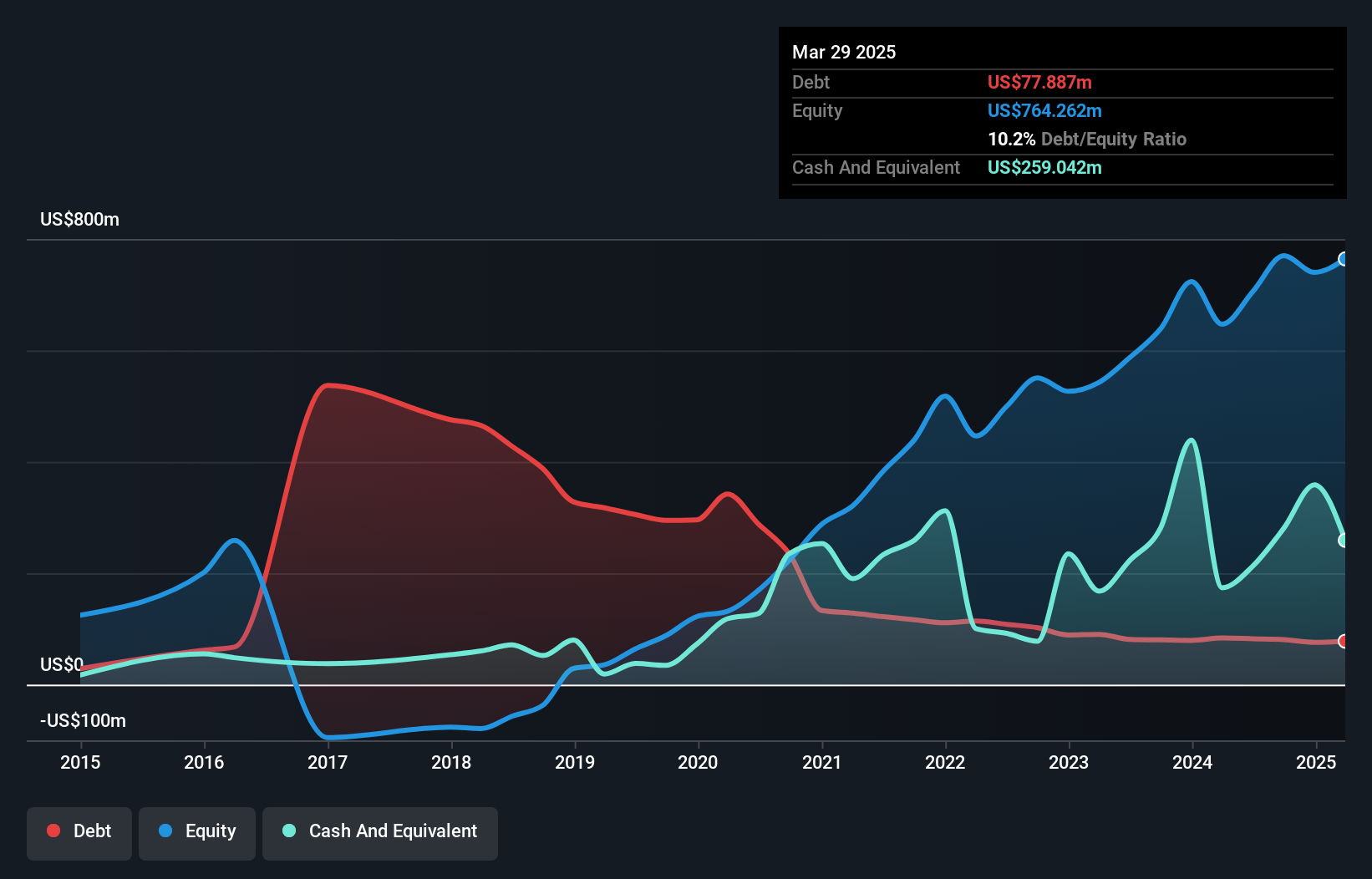Howard Marks put it nicely when he said that, rather than worrying about share price volatility, 'The possibility of permanent loss is the risk I worry about... and every practical investor I know worries about.' It's only natural to consider a company's balance sheet when you examine how risky it is, since debt is often involved when a business collapses. We note that YETI Holdings, Inc. (NYSE:YETI) does have debt on its balance sheet. But is this debt a concern to shareholders?
What Risk Does Debt Bring?
Debt is a tool to help businesses grow, but if a business is incapable of paying off its lenders, then it exists at their mercy. Ultimately, if the company can't fulfill its legal obligations to repay debt, shareholders could walk away with nothing. However, a more common (but still painful) scenario is that it has to raise new equity capital at a low price, thus permanently diluting shareholders. Of course, debt can be an important tool in businesses, particularly capital heavy businesses. The first step when considering a company's debt levels is to consider its cash and debt together.
What Is YETI Holdings's Net Debt?
The image below, which you can click on for greater detail, shows that YETI Holdings had debt of US$77.9m at the end of March 2025, a reduction from US$83.7m over a year. But it also has US$259.0m in cash to offset that, meaning it has US$181.2m net cash.

How Strong Is YETI Holdings' Balance Sheet?
According to the last reported balance sheet, YETI Holdings had liabilities of US$297.2m due within 12 months, and liabilities of US$176.4m due beyond 12 months. Offsetting this, it had US$259.0m in cash and US$120.5m in receivables that were due within 12 months. So it has liabilities totalling US$94.0m more than its cash and near-term receivables, combined.
Since publicly traded YETI Holdings shares are worth a total of US$2.90b, it seems unlikely that this level of liabilities would be a major threat. Having said that, it's clear that we should continue to monitor its balance sheet, lest it change for the worse. Despite its noteworthy liabilities, YETI Holdings boasts net cash, so it's fair to say it does not have a heavy debt load!
Check out our latest analysis for YETI Holdings
YETI Holdings's EBIT was pretty flat over the last year, but that shouldn't be an issue given the it doesn't have a lot of debt. There's no doubt that we learn most about debt from the balance sheet. But ultimately the future profitability of the business will decide if YETI Holdings can strengthen its balance sheet over time. So if you want to see what the professionals think, you might find this free report on analyst profit forecasts to be interesting.
Finally, a company can only pay off debt with cold hard cash, not accounting profits. While YETI Holdings has net cash on its balance sheet, it's still worth taking a look at its ability to convert earnings before interest and tax (EBIT) to free cash flow, to help us understand how quickly it is building (or eroding) that cash balance. During the last three years, YETI Holdings produced sturdy free cash flow equating to 74% of its EBIT, about what we'd expect. This cold hard cash means it can reduce its debt when it wants to.
Summing Up
We could understand if investors are concerned about YETI Holdings's liabilities, but we can be reassured by the fact it has has net cash of US$181.2m. And it impressed us with free cash flow of US$196m, being 74% of its EBIT. So we don't think YETI Holdings's use of debt is risky. Over time, share prices tend to follow earnings per share, so if you're interested in YETI Holdings, you may well want to click here to check an interactive graph of its earnings per share history.
At the end of the day, it's often better to focus on companies that are free from net debt. You can access our special list of such companies (all with a track record of profit growth). It's free.
New: Manage All Your Stock Portfolios in One Place
We've created the ultimate portfolio companion for stock investors, and it's free.
• Connect an unlimited number of Portfolios and see your total in one currency
• Be alerted to new Warning Signs or Risks via email or mobile
• Track the Fair Value of your stocks
Have feedback on this article? Concerned about the content? Get in touch with us directly. Alternatively, email editorial-team (at) simplywallst.com.
This article by Simply Wall St is general in nature. We provide commentary based on historical data and analyst forecasts only using an unbiased methodology and our articles are not intended to be financial advice. It does not constitute a recommendation to buy or sell any stock, and does not take account of your objectives, or your financial situation. We aim to bring you long-term focused analysis driven by fundamental data. Note that our analysis may not factor in the latest price-sensitive company announcements or qualitative material. Simply Wall St has no position in any stocks mentioned.
About NYSE:YETI
YETI Holdings
Designs, retails, and distributes outdoor products under the YETI brand name.
Flawless balance sheet and good value.
Similar Companies
Market Insights
Community Narratives




